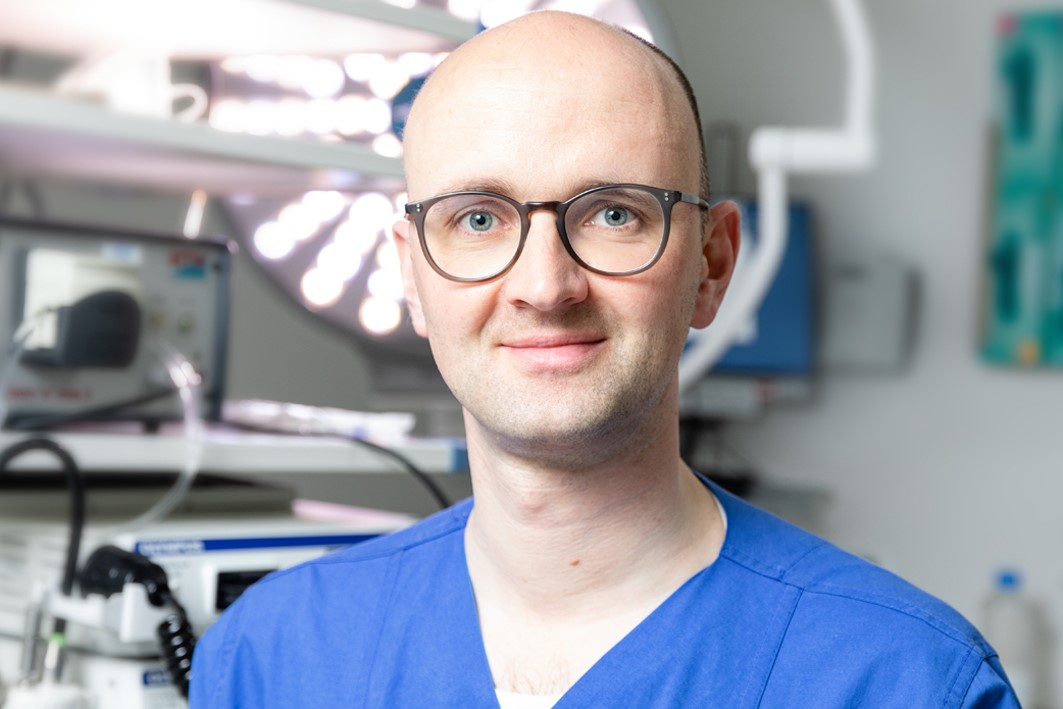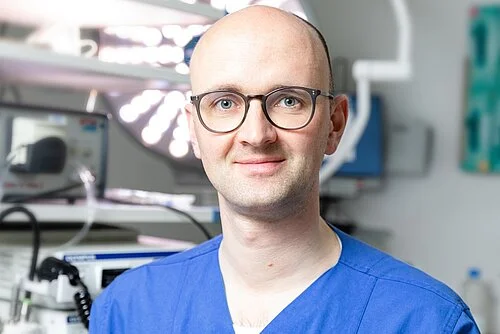Kiel scientist receives 250,000 euros in funding for biomarker research
Professor Konrad Aden receives funding from the Joachim Herz Foundation's Innovation Academy to find a metabolic biomarker for chronic inflammation.
Chronic inflammatory diseases are among the most rapidly increasing forms of illness worldwide in western industrialized nations. They can affect different organ systems, such as the intestines, skin, lungs or joints, and can lead to loss of organ function if left untreated. Members of the Cluster of Excellence "Precision Medicine in Chronic Inflammation" (PMI) are looking for innovative biomarkers, i.e. molecular, characteristic patterns that can be used to detect inflammatory processes at an early stage and thus shorten the time needed for diagnosis and treatment. There are currently no biomarkers that researchers can use to precisely determine systemic inflammation across all diseases using a blood sample - i.e. regardless of the organs in which the inflammation manifests itself, or they are only very imprecise in their diagnosis.
Professor Konrad Aden is researching the importance of amino acid metabolism in chronic inflammatory diseases. Previous research has already identified changes in amino acid metabolism in numerous chronic inflammatory diseases. Based on these findings, Aden has developed an innovative measurement method to visualize amino acid metabolism even more precisely in patients. He now wants to further develop this measurement method for broader use in clinical practice in order to make the changes in amino acid metabolism usable as a biomarker for chronic inflammation.
The Joachim Herz Foundation's Innovation Academy for Application-Oriented Infection Research is now supporting him with around 250,000 euros. With this program, the foundation supports application-oriented, interdisciplinary and high-risk research projects at the interface between engineering, natural sciences and medicine that are highly relevant to infection research and have added value for society. With his concept of the metabolic biomarker, Aden was able to convince the jury that this biomarker has the potential for possible application in clinical diagnostics. The funding is intended to further support the development of the metabolic biomarker and test its diagnostic potential in patients for the first time.
Prof. Aden is a senior physician in the Department of Internal Medicine I at the University Medical Center Schleswig-Holstein (UKSH), Campus Kiel, and research group leader at the Institute of Clinical Molecular Biology at Kiel University (CAU) and the UKSH, as well as a member of the PMI Cluster of Excellence.
Scientific contact:
Prof. Dr. Konrad Aden
Department of Internal Medicine I, UKSH, Campus Kiel
Institute of Clinical Molecular Biology , Kiel University and UKSH, Campus Kiel
+49 431/500- 22455
k.aden@ikmb.uni-kiel.de
Prof. Dr. Konrad Aden, member of the Cluster of Excellence "Precision Medicine in Chronic Inflammation" (PMI), internist at the Department of Internal Medicine I at the UKSH, Kiel Campus, and researcher at the Institute of Clinical Molecular Biology, Faculty of Medicine at Kiel University.
About the Cluster of Excellence PMI
The Cluster of Excellence "Precision Medicine in Chronic Inflammation" (PMI) is being funded from 2019 to 2025 through the German Excellence Strategy (ExStra). It succeeds the "Inflammation at Interfaces” Cluster, which was already funded in two periods of the Excellence Initiative (2007-2018). Around 300 members from eight institutions at four locations are involved: Kiel (Kiel University, University Medical Center Schleswig-Holstein (UKSH), Muthesius University of Fine Arts and Design, Kiel Institute for the World Economy (IfW), Leibniz Institute for Science and Mathematics Education (IPN)), Lübeck (University of Lübeck, University Medical Center Schleswig-Holstein (UKSH)), Plön (Max Planck Institute for Evolutionary Biology) and Borstel (Research Center Borstel - Leibniz Lung Center).
The goal is to translate interdisciplinary research findings on chronic inflammatory diseases of barrier organs to healthcare more intensively, as well as to fulfil previously unsatisfied needs of the patients. Three points are important in the context of successful treatment, and are therefore at the heart of PMI research: the early detection of chronic inflammatory diseases, the prediction of disease progression and complications, and the prediction of individual responses to treatment.
Press office
fbuhse@uv.uni-kiel.de+49 (0)431/880 4682 https://precisionmedicine.de
Cluster of Excellence "Precision Medicine in Chronic Inflammation"
Scientific Office
Head: Dr. habil. Susanne Holstein Postal
Christian-Albrechts-Platz 4, 24118 Kiel, Germany
Contact: Sonja Petermann
+49 (0)431 880-4850, fax: +49 (0)431 880-4894
spetermann@uv.uni-kiel.de
Twitter: PMI @medinflame



